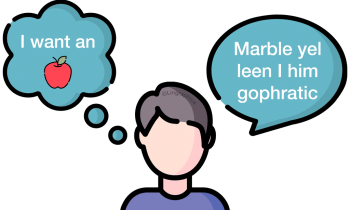Wernicke’s Aphasia
From across the room, the speech of someone with Wernicke’s aphasia might seem typical. People with Wernicke’s aphasia typically speak in long sentences, and speech comes easily. However, when you get closer, you will realize that the words they are saying do not make any sense – or might not even be real words.
Wernicke’s aphasia is characterized by fluent speech that does not make sense. Because of this, Wernicke’s aphasia is also known as fluent aphasia and receptive aphasia. Wernicke’s aphasia is sometimes referred to as “word salad” because speech tends to include random words and phrases thrown together.
Wernicke’s aphasia results from damage to Wernicke’s area of the brain. Wernicke’s area is a part of the brain that is responsible for language comprehension. It is typically found in the left hemisphere. Both the aphasia and the area of the brain are named after Carl Wernicke, a German physician who linked these characteristics with the specific area of the brain.
People with Wernicke’s aphasia often experience fewer physical limitations as a result of their stroke. Although this is beneficial, it also means that people with Wernicke’s aphasia often do not look like stroke survivors or people with disabilities. Because of this, Wernicke’s aphasia can be mistaken for intoxication or mental health issues.
A person with Wernicke’s aphasia is often unaware of their errors, and also has a comprehension impairment.
Characteristics of Wernicke’s Aphasia
- Speech is fluent with typical prosody and intonation
- Speech does not make sense; the words do not make a coherent thought
- Speech often includes neologisms, or invented words that have no meaning
- Impairment with repeating words/phrases
- Impairment understanding , often severe
- Writing is impaired and output resembles spoken language
- Reading comprehension is impaired
- Most people with Wernicke’s aphasia are not aware of their errors.
Click on the tiles below to learn more about the most common types of aphasia.
Anomic Aphasia

Global Aphasia

Transcortical Motor Aphasia

Broca's Expressive Aphasia

Mixed Transcortical Aphasia

Transcortical Sensory Aphasia

Conduction Aphasia

Primary Progressive Aphasia

Wernicke's Aphasia

